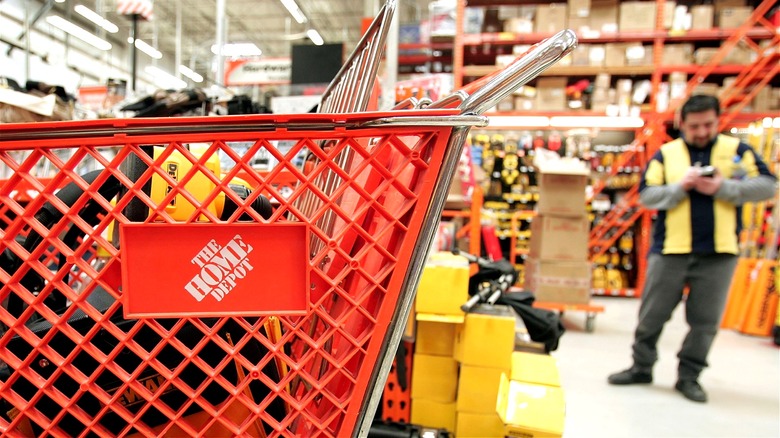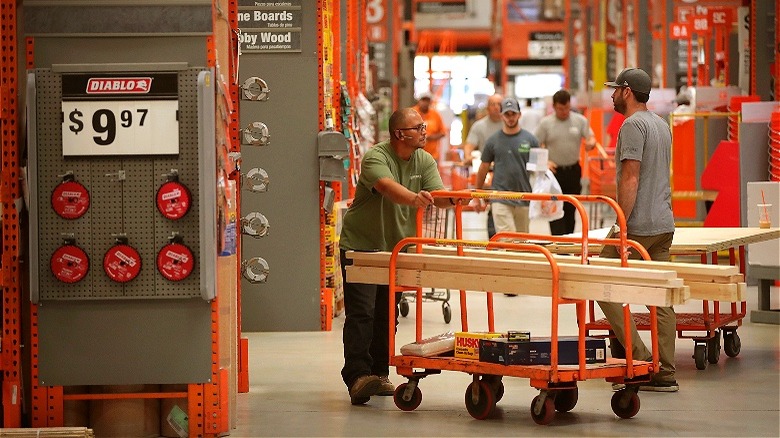The Home Depot's Latest Prediction Could Be A Warning Sign For The Economy
While most of us might not think of the Home Depot as a beacon for the economy, the company's projected revenues offer a lot of insight into consumer mindsets. Recently, the company announced it expects sales to drop during the back half of 2024. In fact, the original orange DIY store expects its full-year sales to decline by as much as 3% to 4% compared with its prior fiscal year total. While a single company's declining sales aren't in and of itself significant, the reason behind this consumer behavior (as well as the kind of consumers being affected) could serve as a significant warning sign for the larger economy.
When discussing the trend of consumers deferring home projects, Home Depot's chief financial officer, Richard McPhail, told CNBC that it's not only due to higher financing costs, but customers are now "deferring because of a sense of greater uncertainty in the economy." On top of the fact that deferring some home maintenance projects can be dangerous, consumers choosing to neglect these projects over economic fears could be a sign the Federal Reserve's current policies aren't working anymore.
As most of us know, rising interest rates were implemented to cool down runaway inflation in the U.S. Yet, some argue that the prolonged nature of these increased interest rates could instead land us in a recession. This is especially concerning in light of increasing unemployment numbers and a slowing job market.
Why the Home Depot's sales matter
The Home Depot is one of many different retailers, however, the reason it can serve as more of an economic indicator has to do with its unique customer base. Generally speaking, the average Home Depot consumer is more financially stable than consumers at other retailers. This is because about half of the company's sales are from actual home professionals, with the other half of sales coming from DIY customers. Given the kinds of products available at the Home Depot, it should come as a surprise to no one that out of the 50% of sales generated by DIY customers, 90% of those customers own their own homes. And in general, homeowners tend to be more financially stable than renters, with higher net worth and better financial situations.
The most recent (i.e., second quarter 2024) sales data from the Home Depot marked the seventh consecutive quarter of negative comparable sales. The quarter experienced a comparable sales drop of 3.3% across the entire business, and a 3.6% decline in the United States specifically. It's worth noting that this was over an entire percentage point more than analysts had predicted.
As relatively more financially stable consumers begin to change their spending habits (for example, deferring home projects they would source materials from the Home Depot) in response to economic hardship, it becomes clear just how much U.S. consumers are financially struggling across multiple income levels. As the problem gets more widespread, fears over the possibility of the U.S. entering a recession rise (especially when you consider how many recession red flags the country is currently experiencing).
Other economic considerations
Note that interest rates also play a part in the Home Depot's sales slowdown. Consumers' increasing inability to borrow money, thanks to high interest rates, is a significant part of their decisions to defer home projects. For those who might not realize, the Home Depot offers loans for larger-scale home projects that consumers need materials for. With a borrowing limit of up to $55,000, and repayment periods for as long as 144 months, these loans can be an attractive way for consumers to purchase the materials required for larger home improvement projects. However, increased interest rates on those loans can make them no longer affordable for many. Without an affordable way to borrow money to fund a project, consumers are choosing instead to wait.
In addition to hurting sales, this deferral trend can also have larger-reaching effects throughout the housing market. Some homeowners might decide to delay selling their homes altogether due to high interest rates keeping them from making necessary improvements for better ROI (remember, not all home improvement projects will lead to good ROI). Similarly, high interest rates are keeping many would-be buyers out of the market, too, making it less attractive to try and sell a home in the current environment. In this way, the drop in the Home Depot's sales connects to the greater housing market and its financial struggles in the wake of prolonged high interest rates. This could continue to fuel not only the housing shortage but also contribute to the ever-increasing prices of homes across the country.


